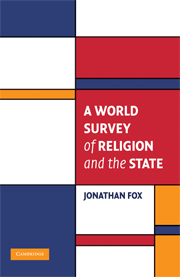Book contents
- Frontmatter
- Contents
- Acknowledgments
- 1 Introduction
- 2 The Question of Religion's Role in Politics and Society Modernization, Secularization, and Beyond?
- 3 Quantifying Religion
- 4 Global GIR from 1990 to 2002
- 5 Western Democracies
- 6 The Former Soviet Bloc
- 7 Asia
- 8 The Middle East and North Africa
- 9 Sub-Saharan Africa
- 10 Latin America
- 11 Patterns and Trends
- 12 Conclusions
- Appendix: Data Collection and Reliability
- Bibliography
- Index
8 - The Middle East and North Africa
Published online by Cambridge University Press: 05 June 2012
- Frontmatter
- Contents
- Acknowledgments
- 1 Introduction
- 2 The Question of Religion's Role in Politics and Society Modernization, Secularization, and Beyond?
- 3 Quantifying Religion
- 4 Global GIR from 1990 to 2002
- 5 Western Democracies
- 6 The Former Soviet Bloc
- 7 Asia
- 8 The Middle East and North Africa
- 9 Sub-Saharan Africa
- 10 Latin America
- 11 Patterns and Trends
- 12 Conclusions
- Appendix: Data Collection and Reliability
- Bibliography
- Index
Summary
The Middle East and North Africa (MENA) region scores higher on the RAS measures than any other world region. Despite a number of commonalities, there is considerable diversity in the nature of government involvement in religion (GIR) in the region. For the purposes of this study the MENA includes the Arab states of what is commonly known as the Middle East, as well as Israel, Turkey, and the Arab states of North Africa.
Islam is particularly influential in the region. For example, in nearly all of the region's states, including Israel and Lebanon, Islamic Sharia law guides family law for Muslims. Eighteen of the 20 states in this region are ruled by Muslims. Israel is governed by Jews but it has a substantial Muslim population and Muslims are elected to its parliament. Lebanon is governed jointly by Christians and Muslims.
As presented in Tables 8.1, 8.2, 8.3, and 8.4, separation of religion and state (SRAS) is practically nonexistent in the MENA. Overall, MENA states have the highest average scores on all of the RAS variables and, as documented in Chapter 11, these numbers have increased since 1990. All but three of the region's governments have an official religion. Two are coded as civil religion, meaning that while there is no official state religion, the government behaves as if there is one. The final state, Lebanon, supports several religions precisely because of its consociational agreement, which divides all aspects of politics along religious lines.
- Type
- Chapter
- Information
- A World Survey of Religion and the State , pp. 218 - 248Publisher: Cambridge University PressPrint publication year: 2008



